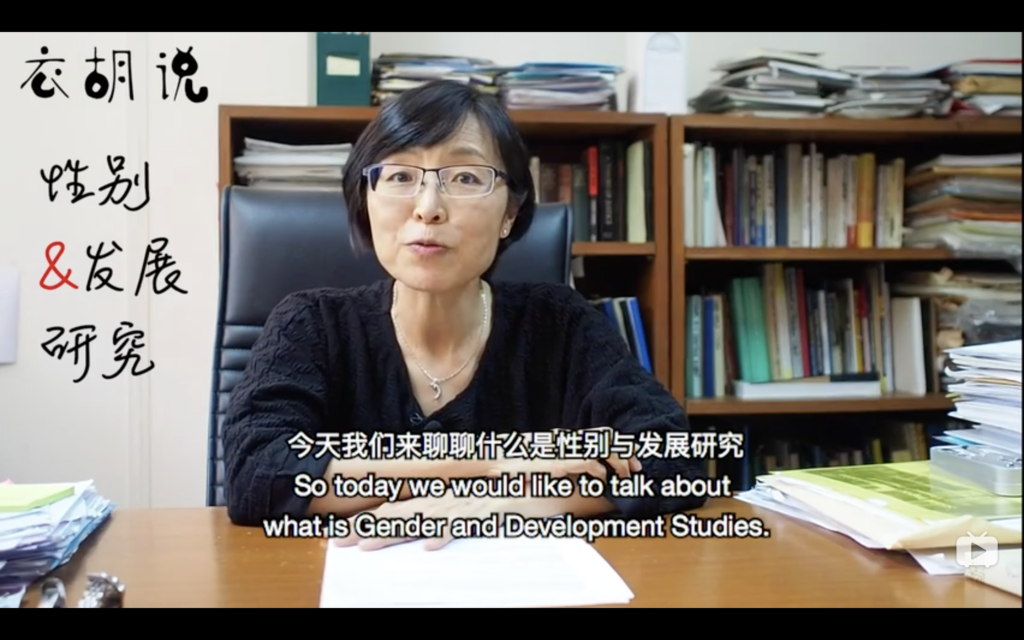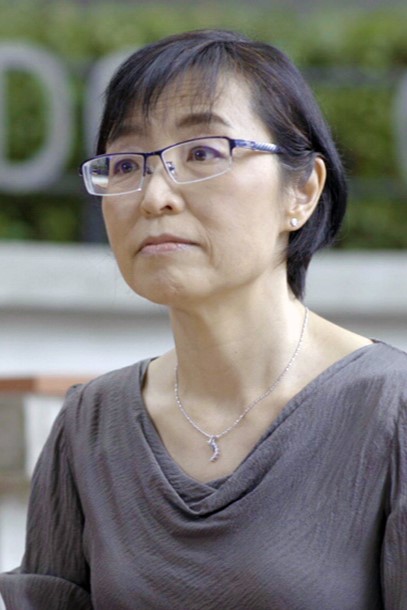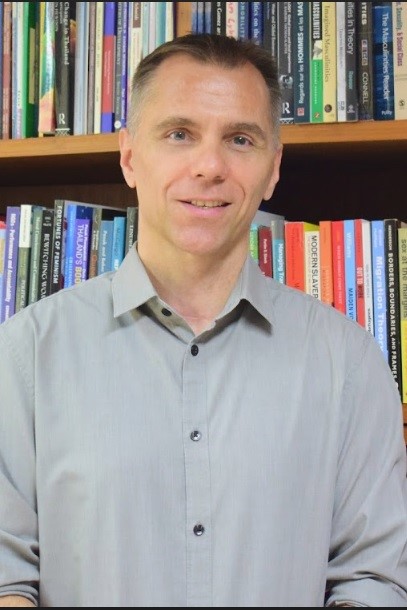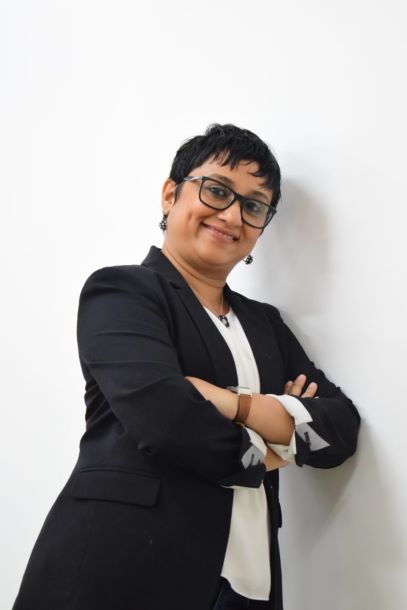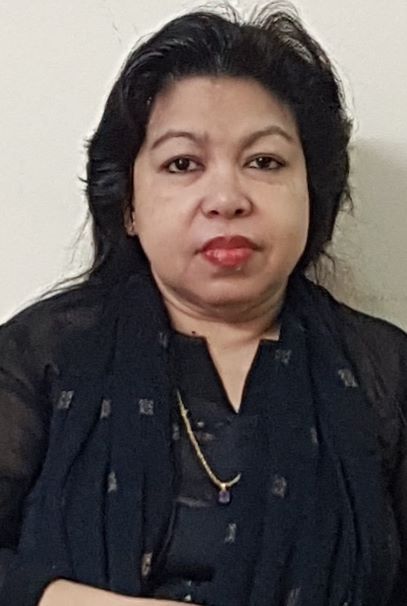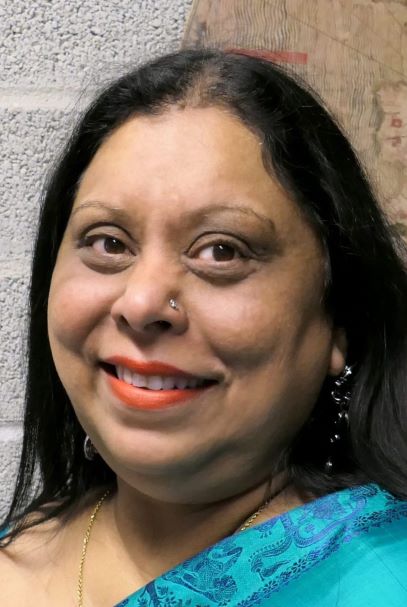Gender and Development Studies
Aims to be a center of excellence in gender and development studies by integrating gender equality as a key intellectual perspective and ethical concern in sustainable development.
About GDS
Gender and Development Studies (GDS) develops scholars, analysts and practitioners who can integrate gender approaches in to development planning and management, and conduct original gender and development-related research for advancing development goals, including the Sustainable Development Goals, globally and in Asia. As an academic arm of community-based efforts for gender equality and for the advancement of rights and inclusion of women and individuals of all sexual orientation and gender identity expression, GDS aims to be a center of excellence in gender and development studies by integrating gender equality as a key intellectual perspective and ethical concern in sustainable development.

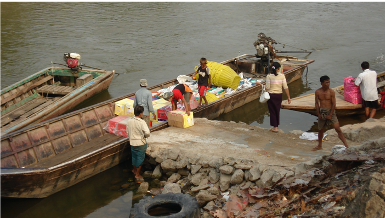
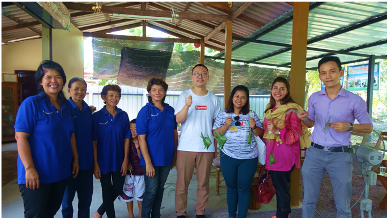
The Vision of GDS is to be center of excellence in Gender and Development Studies in the Asian region that:
- Trains specialists in gender and development;
- Increases gender awareness among technology, management and development professionals;
- Generates knowledge through interdisciplinary research and publications in technology, development, and gender relations in Asian societies;
- Assists other institutions in Asia to strengthen gender studies through training, research and outreach; and
- Functions as an academic arm of community-based efforts for the advancement of women and sustainable development.
By functioning as an academic arm of community-based efforts for the advancement of women, equity-based sustainable development and poverty alleviation, GDS aims to work as a regional center of excellence in the field of gender, technology and development studies, and to integrate gender as a key intellectual perspective and ethical concern in AIT as well. This is to be achieved by:
- Teaching post-graduate students in GDS to create gender experts, as well as co-teaching in other fields of study in AIT to create gender-sensitive/gender-responsive engineers, managers and scientists
- Generating knowledge through interdisciplinary research and publication in technology, development, and gender relations in Asian societies;
- Providing advice and assistance to academic, policy units and external agencies with regards to gender issues and gender-responsive development strategies;
- Providing short term courses to development practitioners and organizations in Asia;
- Forging linkages with international women’s studies and gender studies research networks and associations to engage in the current drift of debates and issues that would enhance curriculum-building.
All about news and events
New DAAD Scholars Bring Global Perspectives to AIT’s Gender and Development Program: Applications Open for August 2025 Intake
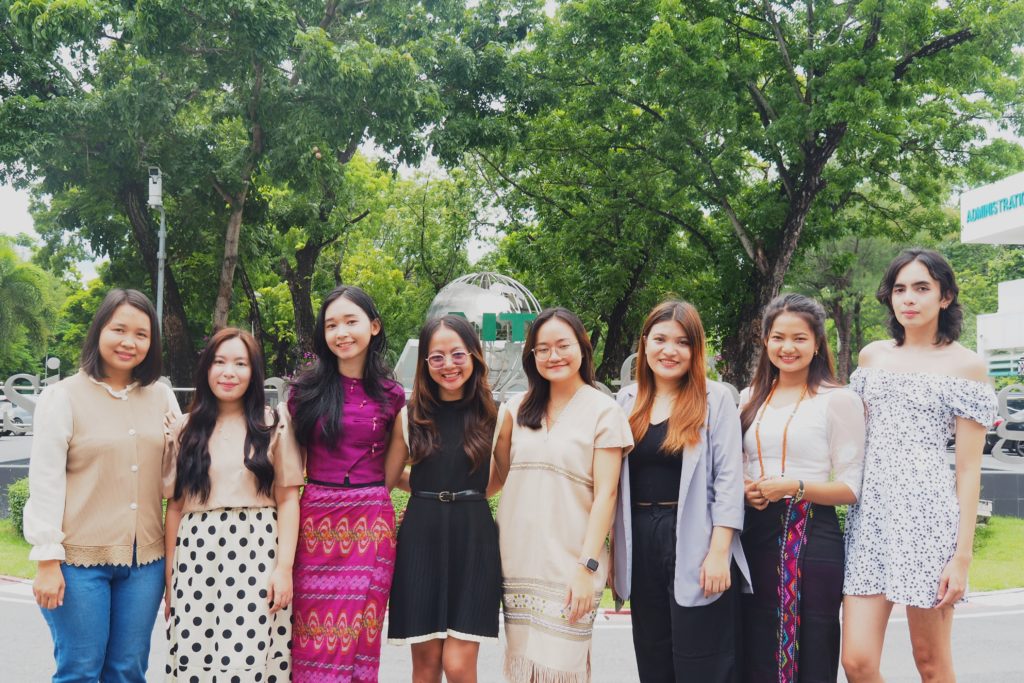
In August 2024, the Gender and Development Studies (GDS) Program at the Asian Institute of Technology (AIT) proudly welcomed nine DAAD scholars from Cambodia, Myanmar, the Philippines, and Vietnam. These scholars bring diverse experiences and fresh perspectives, enriching the GDS community with their dedication to gender equality and development.
Students from Nagoya University of Foreign Studies, Japan Explore Gender and Development in Thailand:
A Study Visit with AIT's GDS Program
NUFS students dive into gender and development issues in Thailand through AIT’s GDS study program. From visiting key organizations to exploring grassroots efforts in rural communities, this 12-day experience fostered deeper understanding and global perspectives on gender equality.
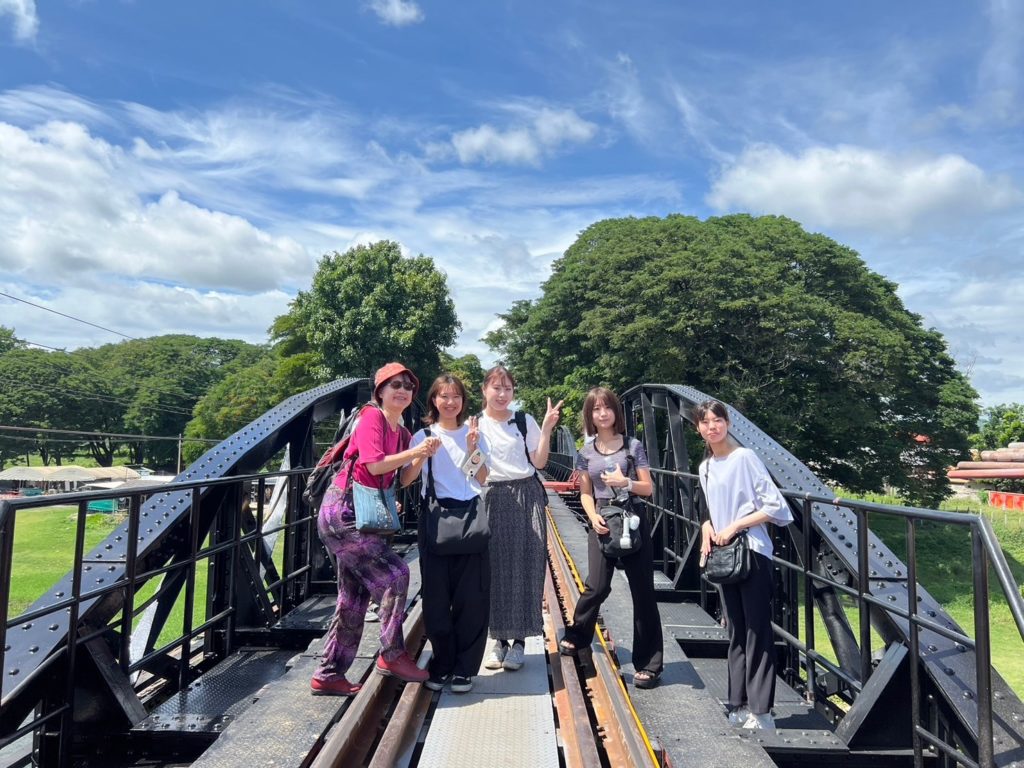
Internship and Exchange program
GDS has a wide network in the region and offers student exchange as well as internship opportunities
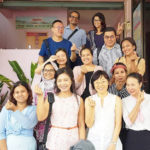
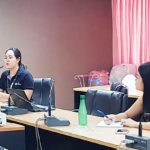
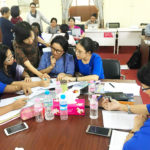
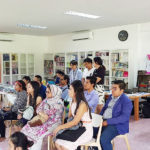
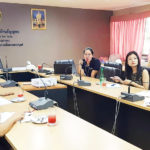

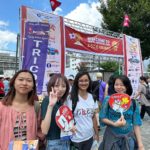
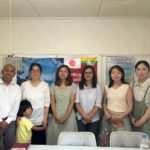
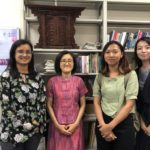

Gender and Development Students Engage in International Workshop at Ochanomizu University
Parichat Meesomsakdi, a Masters’s student, and Marissa Hernando-Valdez, a PhD student from the Gender and Development Studies Program at AIT, participated in the Ochanomizu University–Asian Institute of Technology Workshop Programme held from July 25 to August 1, 2024, in Tokyo, Japan. The program included visits to various institutions and organizations relevant to their thesis research on women in micro, small, and medium enterprises (MSMEs) and agriculture.
Read about there experience here

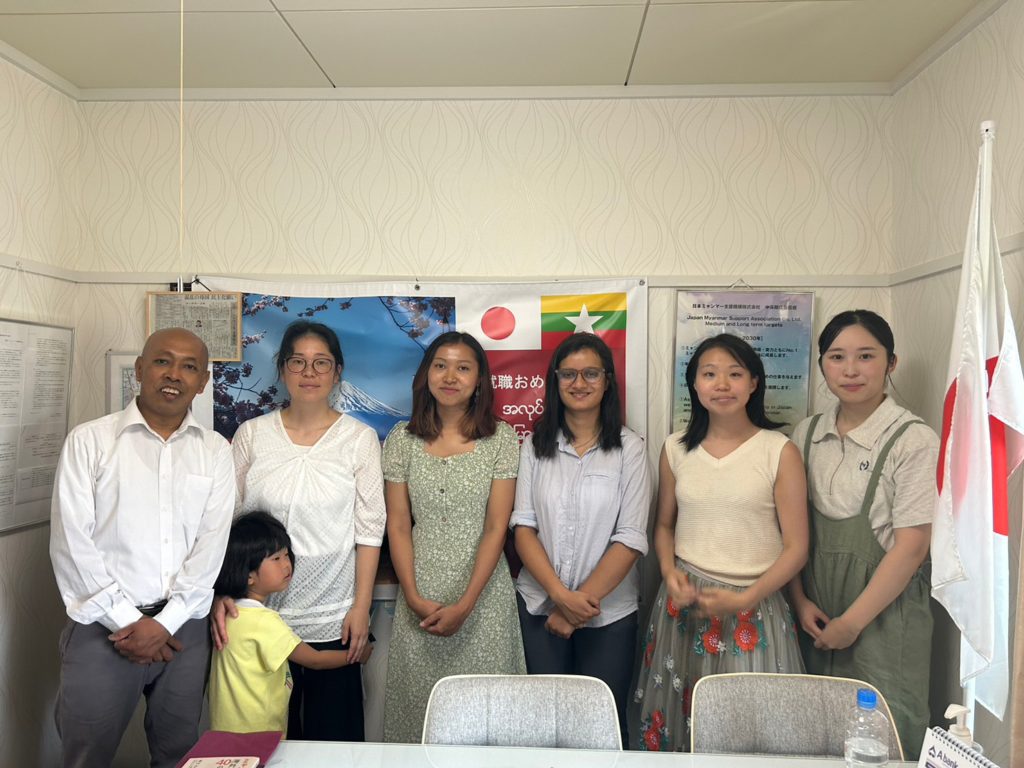
Exchange Program between GDS, AIT and Ochanomizu University
Exchange Program between GDS, AIT and Ochanomizu – The Asian Institute of Technology (AIT) has consistently advocated “Learning across borders” over the years. It promotes learning across borders from students worldwide and allows its students to travel and learn different interesting perspectives through exchange programs. We were lucky enough to be a part of one of those exciting exchange programs at Ochanomizu University, Japan, from our course Gender and Development Studies, as a part of the agreement between Gender and Development Studies at AIT and the Institute of Gender Studies at Ochanomizu University. Read full article click here or https://bit.ly/3qIoswg
Research Areas
Gender and environment, Development planning/management, Globalization, Employment, Health, Politics/human rights, Technologies, Development communication, Migration, Gender-based violence, Gender main- streaming, Masculinities, etc.
Career Prospect
UN organizations: UNDP, UN Women, ILO, ADB; International NGOs: Oxfam, Care International; Academic Institutions; Government organizations: Ministry of Women’s Affairs, Ministry of Home Affairs
Publications
Book Chapters
Kusakabe, Kyoko (2020) “Migrant workers and childcare at the place of destination: An overview of issues in the Mekong Region, South East Asia”, in Shirlena Huang and Kanchana N. Ruwanpura (eds.) Handbook on gender in Asia, International Handbooks on Gender series, Edward Elgar Publishing, Cheltenham UK and Northampton MA, USA, 360-373.
Kusakabe, Kyoko, Sok Serey and Methinee Phoovatis (2020) “Study on demographic change in fishing communities in Cambodia and Thailand”, in Siar, S.V. and Kusakabe, K. (eds) Demographic change in Asian fishing communities – drivers, outcomes and potential impacts, FAO: Bangkok, 37-84.
Kusakabe, Kyoko (2017) “Street vending in Phnom Penh: Flourishing but invisible” in Simon Springer and Katherine Brickell (eds) Routledge Handbook of Contemporary Cambodia, Routledge, 257-268.
- Lorina Sthapit and Philippe Doneys (2017), “Female Maoist combatants during and after the People’s War”, in Ashild Kolas (ed.), Women, Peace and Security in Nepal, London: Routledge.
- Kusakabe, Kyoko (2016) “Street vending in Phnom Penh: Flourishing but invisible” in Simon Springer and Katherine Brickell (eds) Routledge Handbook of Contemporary Cambodia, Routledge.
- Kusakabe, Kyoko and Ruth Pearson (2016) “Childcare arrangements of Burmese migrant workers in Thailand”, in Nicola Ansell, Natascha Klocker and Tracey Skelton (eds) Geographies of global issues: changes and threat, Geographies of children and young people, Singapore: Springer, 1-24.
- Kusakabe, Kyoko and Ruth Pearson (2015) “Remittances and women’s agency: Managing networks of obligation among Burmese migrant workers in Thailand” in Lan Anh Hoang and Brenda Yeoh (eds) Transnational labour migration, remittances and the changing family in Asia, New York:Palgrave, 50-81.
- Veena N and Kyoko Kusakabe (2015) “Gender and land tenure in the context of disaster” in Kusakabe, Kyoko, Rajendra Shrestha and Veena N. (eds) Gender, land tenure and disaster, London:Springer, 1-14.
- Doane, Donna L. and Philippe Doneys (2015), “Lost in Translation? Gender and Economic Empowerment in the Greater Mekong Sub-Region”, in Ragnhild Lund, Philippe Doneys and Bernadette Resurreccion (eds.), Gender Entanglements: Revisiting Gender in a Rapidly Changing Asia , Copenhagen: NIAS press.
- Kusakabe, Kyoko and Prak Sereyvath (2015), “Women Fish Border Traders in Cambodia: Intersectionality and Gender Analysis”, in Ragnhild Lund, Philippe Doneys and Bernadette Resurreccion (eds.), Gender Entanglements: Revisiting Gender in a Rapidly Changing Asia , Copenhagen: NIAS press.
- Resurreccion, Bernadette, Philippe Doneys and Ragnhild Lund (2015), “Gender entanglements in gender and development: a call for grounded, multi-dimensional and ‘moving’ feminisms”, in Ragnhild Lund, Philippe Doneys and Bernadette Resurreccion (eds.), Gender Entanglements: Revisiting Gender in a Rapidly Changing Asia, Copenhagen: NIAS press.
- Lund, Ragnhild, Philippe Doneys and Bernadette Resurreccion (2015), “Introduction”, in Ragnhild Lund, Philippe Doneys and Bernadette Resurreccion (eds.), Gender Entanglements: Revisiting Gender in a Rapidly Changing Asia, Copenhagen: NIAS press, 2015.
- Lund, Ragnhild, Kyoko Kusakabe, Smita Mishra Panda, Wang Yunxian (eds.) (2014) Gender, mobilities, and livelihood transformations: Comparing indigenous people in China, Laos, and India, London: Routledge.
- Kusakabe, Kyoko and Ruth Pearson (2014), ‘What does political change in Burma offer migrant workers in Thailand?’. In Mikael Gravers and Flemming Ytzen (eds), Burma/Myanmar – Where Now? Copenhagen: NIAS Press, pp.364-368.
- Kusakabe, Kyoko (2014) “Forging an international network of gender and development practitioners: IFP students at the Asian Institute of Technology”, in Terance W. Bigalke and Mary S. Zurbuchen (eds) Leadership for social justice in higher education: The legacy of the Ford Foundation International Fellowship Program, New York:Palgrave Macmillan, pp.155-169.
- Kusakabe, Kyoko and Ruth Pearson (2014) “Burmese female migrant workers in Thailand: Managing productive and reproductive responsibilities”, in Thanhdam Truong et al. (eds) Migration gender and social justice, Springer, 69-86.
- Kusakabe, Kyoko (2014) “Coping Capacity of Small-scale Border Fish Traders in Cambodia” in Brun, C., P. Blaikie and M. Jones (eds) Alternative Development: Unravelling marginalization, voicing change. Surrey:Ashgate, 259-268.
- Kumar, Kyoko Kusakabe, Pravakar Pradhan, Pujan Shrestha, Srujana Goteti, Tran Anh Tuan, Ekawit Meteejaroenwong, Trinnawat Suwanprik, Khanh Linh, (2014) “Greenhouse Gas Emissions from Tourism Service Providers: Case Studies in Chiang Mai, Thailand and Hue, Vietnam”, in Louis Lebel, Chu Thai Hoanh, Chayanis Krittasudthacheewa and Rajesh Daniel (eds) Climate risks, regional integration, and sustainability in the Mekong region, published by Strategic Information and Research Development Centre (SIRD) and SUMERNET Secretariat, Selangor, Malaysia, 248-269.
- Kusakabe, Kyoko and Sengkham Vongphakdy (2013) “Gender vulnerabilities of resettlement and restricted mobility of ethnic groups in northern Laos” in Lund et al. (eds) Transformations of indigenous people’s lives and livelihoods: Mobilities in China, Laos, and India, Routledge, pp.134-165.
- Kusakabe, Kyoko (2012) “Case based gender process monitoring”, in Reflecting on gender equality and human rights in evaluation, UNWomen, Bangkok, pp.35-46.
- Kusakabe, Kyoko (2012) “Introduction: Gender, roads and mobility in Asia”; “Gender, mobility and road construction in Greater Mekong Subregion”; “Conclusion” Studying gender relations in a mobile world” in Kyoko Kusakabe (ed) Gender, roads, and mobility in Asia, Practical Action Publishing, UK.
- Banpanasirichote, Chantana Philippe Doneys, Mike Hayes, Chandan Sengupta (2012), “Introduction”, in Chantana Banpanasirichote, Philippe Doneys, Mike Hayes, Chandan Sengupta, (eds.), Mainstreaming Human Security in Asia, Bangkok: Chula Global Network [ISBN 978-616-551-473-6], p. 1-14.
Books
Lund, Ragnhild, Kyoko Kusakabe, Nitya Rao and Nireka Weeratunge (eds) (2020) Fisherfolk in Cambodia, India and Sri Lanka: Migration, gender and well-being, Routledge.
Siar, Suzana and Kyoko Kusakabe (eds) (2020) Demographic change in Asian fishing communities: Drivers, outcomes and potential impacts, Food and Agriculture Organization of the United Nations, Bangkok.
- Kusakabe, Kyoko and Carli Melo (2019) Jobs at SEZs: Migrant garment factory workers in the Mekong Region, Asian Institute of Technology and Mekong Migration Network.
Veena N. and Kyoko Kusakabe (2018) Into the light: Young female migrant workers in Thailand’s seafood sector and their access to decent work, Plan International.
Kusakabe, Kyoko, Khamnuan Kheuntha, Raksa Sok, Apimuk Wichasorn, Thanchanok Khawngoenyuang, Veena N. (2018) Labour migration and human trafficking: An analysis of laws, regulations and policies in Thailand and Cambodia, GVC South East Asia and GVC Italy, Cambodia.
- Kusakabe, Kyoko, Rajendra Shrestha and Veena N. (eds) (2015) Gender and land tenure in the context of disaster in Asia, London:Springer.
- R. Lund, P. Doneys, B. Resurreccion (eds) (2015), Gendered Entanglements: Revisiting Gender in Rapidly Changing Asia , NIAS press, 2015.
- Lund, R., K. Kusakabe, S. Mishra Panda, W. Yunxian (eds.) (2014), Gender, mobilities, and livelihood transformations: Comparing indigenous people in China, Laos, and India, London: Routledge.
- Pearson, Ruth and Kyoko Kusakabe (2012), Thailand’s Hidden Workforce: Burmese Migrant Women Factory Workers, Asian Argument Series, London: Zed Books.
- Kusakabe, Kyoko (ed) (2012), Gender, road and mobility in Asia, London: Practical Action Publishing.
- Banpanasirichote, Chantana, Philippe Doneys, Mike Hayes, Chandan Sengupta, (eds.) (2012), Mainstreaming Human Security in Asia, Bangkok: Chula Global Network [ISBN 978-616-551-473-6].
Journal Papers
Gopal, Nikita, Holly M. Hapke, Kyoko Kusakabe, Surendran Rajaratnam, Meryl J. Williams (2020) “Expanding the horizons for women in fisheries and aquaculture”, Gender, technology and Development
Venkatesh, Anitha, Kyoko Kusakabe and Veena N. (2020) “Indigenous people’s response to the ban on use of forest resources in South India: a gender analysis of governmobility”, Environment, Development and Sustainability 22, 1489-1504.
- Petcho, Wachira, Sylvia Szabo, Kyoko Kusakabe, Vimolwan Yukongdi (2019) “Farmers’ perception and drivers of membership in rice production community enterprises: evidence from the Central Region, Thailand’, Sustainability, 11:5445.
- Kusakabe, Kyoko, Khamnuan Khuenta, Tiwaporn Hemsakul, Veena N. (2019) “Building a home away from home: Housing choices of labor migrants in Thailand”, Migration and Development, 8:2, 176-191.
- Kusakabe, Kyoko and Aye Chan Myae (2019) “Precarity and Vulnerability Under Expansion of Rubber Plantation in Northern Laos and Northern Shan State”, Journal of Contemporary Asia 49:4, 586-601.
- Kusakabe, Kyoko, Jonathan Rigg & Ståle Angen Rye (2018): Jakobsen, Thomas Sætre. 2017. “Living in Transition – Peasant-Workers Working Between Farmland and the Workplaces of the Urban in Post-Deng China”, Norsk Geografisk Tidsskrift – Norwegian Journal of Geography, 72:4, 248-249.
- Buranajaroenkij, Duanghathai, Philippe Doneys, Kyoko Kusakabe, Donna L Doane (2018) “Expansion of women’s political participation through social movements: The case of red and yellow shirts in Thailand”, Journal of Asian and African Studies, 53:1, 34-48.
Gopal, Nikita, Meryl Williams, Siri Gerrard, Susana Siar, Kyoko Kusakabe, Louis Lebel, Holly Hapke, Marilyn Porter, Anne Coles, Natahsa Stacey and Ram Bhujel (2017) “Guest Editorial: Engendering Security in Fisheries and Aquaculture”, Gender in aquaculture and fisheries: Engendering security in fisheries and aquaculture, Asian Fisheries Science, Special issue 30S, 1-30.
- Farha Naz, Philippe Doneys, Shahab E. Saqib (2017), Adaptation strategies to floods: A gender-based analysis of the farming- dependent char community in the Padma floodplain, Bangladesh, International Journal of Disaster Risk Reduction, https://doi.org/10.1016/j.ijdrr.2017.12.016
- Kyoko Kusakabe, Philippe Doneys, Joyee Chatterjee (2017), Looking Forward, Looking Back : Gender, Technology and Development in a Changing World, Gender, Technology and Development, 21(1-2).
- Rajan Parajuli, Philippe Doneys (2017), Exploring the role of telemedicine in improving access to healthcare services by women and girls in rural Nepal, Telematics and Informatics 34, 1166–1176.
- Aurangzaib Alizai , Philippe Doneys, Donna L. Doane (2016), Impact of Gender Binarism on Hijras’ Life Course and Their Access to Fundamental Human Rights in Pakistan, Journal of Homosexuality, Sept.
- Duanghathai Buranajaroenkij, Philippe Doneys, Kyoko Kusakabe, Donna L Doane (2016), Expansion of Womens Political Participation through Social Movements: The Case of the Red and Yellow Shirts in Thailand, Journal of Asian and African studies, June.
- Phuong Pham, Philippe Doneys, and Donna L. Doane (2016), “Changing Livelihoods, Gender Roles and Gender Hierarchies: the Impact of Climate, Regulatory and Social Changes on Women and Men in a Co Tu Community in Vietnam”, Women Studies International Forum, 54.
- Lund, Ragnhild, Kyoko Kusakabe, Smita Mishra Panda, Wang Yunxian (2016) Building knowledge across transnational boundaries: Collaboration and friendship in research, Emotion, Space and Society 20, 18-24
- Kusakabe, Kyoko (2016) “Women fish processors in Cambodia: Challenges for collective business”, Asian Fisheries Science, 29S, 93-110.
- Kusakabe, Kyoko and Ruth Pearson (2016) “Working through exceptional space: the case of women migrant workers in Mae Sot, Thailand”, International sociology, 31:3, 268-285.
- Shinobu, Sasaki, Kyoko Kusakabe and Philippe Doneys (2016) “Exploring human (in-)security from a gender perspective: A case study of subcontracted workers in Thailand”, International journal of sociology and social policy, 36:5/6, 304-318.
- Moran, M.B., Chatterjee, J.S., Frank, L.B. et al.(2016), “Individual, Cultural and Structural Predictors of Vaccine Safety Confidence and Influenza Vaccination Among Hispanic Female Subgroups“, Journal of Immigrant Minority Health . doi:10.1007/s10903-016-0428-9
- Meghan Bridgid Moran and Lauren B. Frank and Joyee S. Chatterjee and Sheila T. Murphy and Lourdes Baezconde-Garbanati (2016), “A pilot test of the acceptability and efficacy of narrative and non-narrative health education materials in a low health literacy population“, Journal of Communication in Healthcare 9 (1), 40-48
- Meghan Bridgid Moran and Lauren B. Frank and Joyee S. Chatterjee and Sheila T. Murphy and Lourdes Baezconde-Garbanati (2016), “Information scanning and vaccine safety concerns among African American, Mexican American, and non-Hispanic White women“, Patient education and counseling 99 (1), 147-153
Student Voices
GTD Journal
Gender, Technology and Development (GTD) Journal
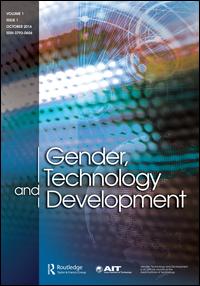
Gender, Technology and Development is an international, multi-disciplinary, refereed journal serving as a forum for exploring and examining the linkages among changing gender relations, technological change and developing societies. The diverse perspectives of the Asian region are the focus of discussion, while dialogues along East-West and North-South lines are also an important aspect of the journal. The overwhelming changes brought about in our lives by the power of technology only serve to emphasize the need for a cutting-edge journal that focuses on the interface of gender, technology and development. This journal serves this crucial niche, thereby bringing issues of future concern to light and highlighting issues that deserve thought and concern in all fora.
The journal, started in the year 1997, is based in the Gender and Development Studies, School of Environment, Resources and Development, Asian Institute of Technology, Thailand. It was published by Sage Publications between 1997 and 2016, and since 2017 by Taylor and Francis (Routledge). NORAD/NMFA has supported the journal for many years as well as the Rockefeller Foundation, USA, and this support is gratefully acknowledged.
Multidisciplinary in nature, Gender, Technology and Development links the activities of women and men to institutions or governments, on the basis of technology, social relations and management. It develops the theory and practice of gender and technological development and defines policy and programs in their political, economic and social contexts. Gender, Technology and Development invites valuable contributions to this field of ever growing importance which the journal, with great pleasure, is committed to bring to the knowledge of the vast academic world. Over the years, the journal has pursued the following aims:
- to provide a platform for debate and dissemination of research findings, conceptual developments and new research areas and techniques that promise to change analyses and perspectives on gender relations, technological change and developing societies;
- to disseminate and promoting research, good practice and innovation in all aspects of gender relations, technological change and developing societies to its main audiences, including educators, researchers, graduate students, policy makers, and practitioners;
- to inform development and technology policy for sustainable development and contributing to research-for-development efforts; and
- to encourage international scientific cooperation and understanding, and enhancing multi-disciplinary research.
Gender, Technology and Development (GTD) has become an important tool for the dissemination of practice-oriented research on gender, technology and development. The total number of articles submitted to GTD had tripled between 2004 and 2013. During the last five years, the full-text downloads have increased dramatically, from 3,591 in 2006 to over 20,000 in 2013. The journal has achieved a Number 2 rank among Norwegian universities in 2012, which is the highest rank of excellence appointed to internationally refereed journals in Norway. The journal is now indexed in the Emerging Sources Citation Index (ESCI). The gains made by the GTD journal, continue to project Gender and Development Studies field in AIT as a regional center of scholarship in gender and development in Asia. It is our view that the strengths of the journal should be sustained and strengthened.
The internationally-based members of the present editorial team of the journal are as follows:
Prof. Yukari Sawada, Tokyo University of Foreign Studies, Japan;
Dr. Rebecca Elmhirst, University of Brighton, UK;
Dr. Joy Clancy, Twente Centre for Studies in Technology and Sustainable Development, Netherlands.
Dr. Kyoko Kusakabe, Asian Institute of Technology, Thailand;
Dr. Philippe Doneys, Asian Institute of Technology, Thailand;
Dr. Joyee Chatterjee, Asian Institute of Technology, Thailand.
Dr. Bernadette Resurreccion, Stockholm Environment Institute, Thailand;
Meet the GDS Team
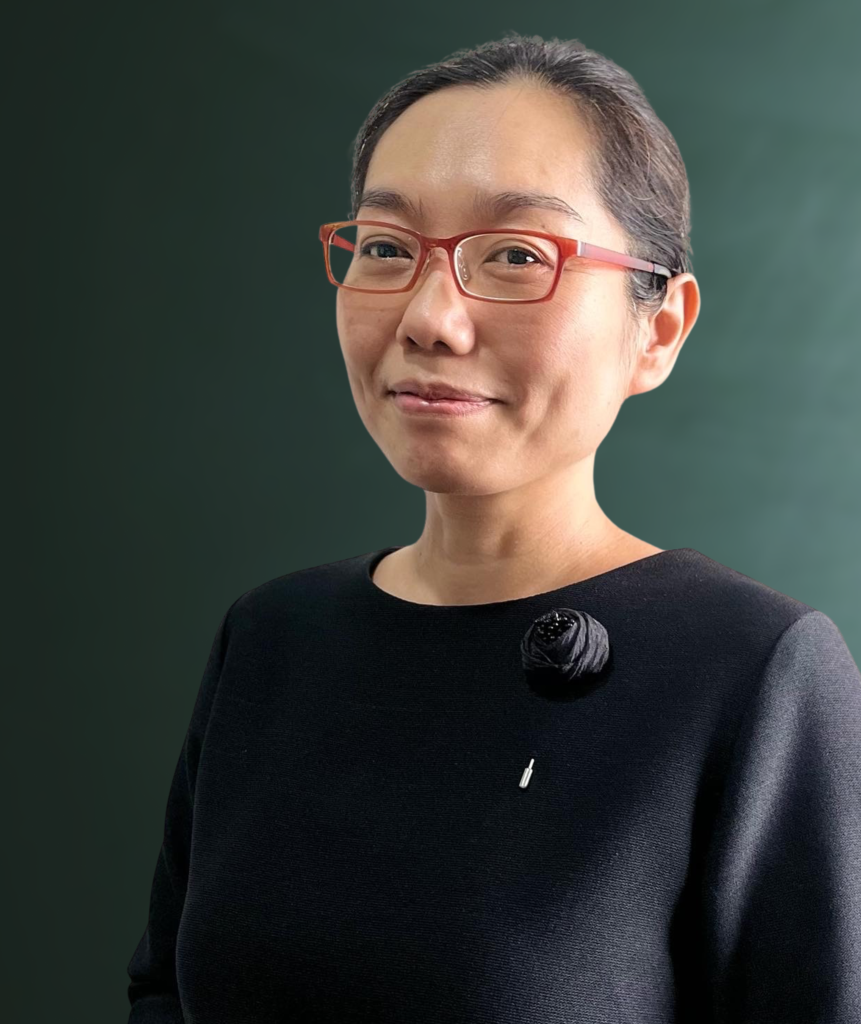
Duanghathai Buranajaroenkij
Gender and Development Studies
Apply Now
Contact Us
Feel free to contact us 😉
